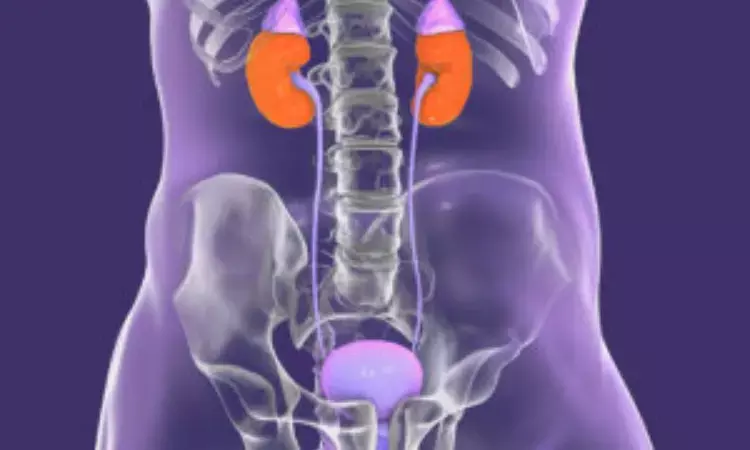- Home
- Medical news & Guidelines
- Anesthesiology
- Cardiology and CTVS
- Critical Care
- Dentistry
- Dermatology
- Diabetes and Endocrinology
- ENT
- Gastroenterology
- Medicine
- Nephrology
- Neurology
- Obstretics-Gynaecology
- Oncology
- Ophthalmology
- Orthopaedics
- Pediatrics-Neonatology
- Psychiatry
- Pulmonology
- Radiology
- Surgery
- Urology
- Laboratory Medicine
- Diet
- Nursing
- Paramedical
- Physiotherapy
- Health news
- Fact Check
- Bone Health Fact Check
- Brain Health Fact Check
- Cancer Related Fact Check
- Child Care Fact Check
- Dental and oral health fact check
- Diabetes and metabolic health fact check
- Diet and Nutrition Fact Check
- Eye and ENT Care Fact Check
- Fitness fact check
- Gut health fact check
- Heart health fact check
- Kidney health fact check
- Medical education fact check
- Men's health fact check
- Respiratory fact check
- Skin and hair care fact check
- Vaccine and Immunization fact check
- Women's health fact check
- AYUSH
- State News
- Andaman and Nicobar Islands
- Andhra Pradesh
- Arunachal Pradesh
- Assam
- Bihar
- Chandigarh
- Chattisgarh
- Dadra and Nagar Haveli
- Daman and Diu
- Delhi
- Goa
- Gujarat
- Haryana
- Himachal Pradesh
- Jammu & Kashmir
- Jharkhand
- Karnataka
- Kerala
- Ladakh
- Lakshadweep
- Madhya Pradesh
- Maharashtra
- Manipur
- Meghalaya
- Mizoram
- Nagaland
- Odisha
- Puducherry
- Punjab
- Rajasthan
- Sikkim
- Tamil Nadu
- Telangana
- Tripura
- Uttar Pradesh
- Uttrakhand
- West Bengal
- Medical Education
- Industry
Sacral neuromodulation effective for treating neurogenic lower urinary tract dysfunction: NEJM

Switzerland: In the short-term, sacral neuromodulation (SNM) was shown to be effective in correcting refractory NLUTD (neurogenic lower urinary tract dysfunction) in well-selected neurologic patients, according to a study published in NEJM Evidence.
Controlling lower urinary tract function is a multilevel, complex process comprising the central and peripheral nervous system. About a million people worldwide are affected by neurogenic lower urinary tract dysfunction, which majorly impacts the quality of life and poses a considerable economic burden on health care systems. Standard treatments such as catheterization and antimuscarinics often remain unsatisfactory owing to side effects associated with their use or a lack of efficacy.
Sacral neuromodulation is a well-established treatment for non-NLUTD, but there is a shortage of randomized controlled trials showing benefits in NLUTD patients. Considering this, Martina D. Liechti, Balgrist University Hospital, University of Zürich, Zürich, Switzerland, and colleagues assessed the safety and efficacy of SNM for treating patients with NLUTD in a controlled trial.
For this purpose, the researchers recruited patients with refractory NLUTD (and intended SNM) in this sham-controlled, double-blind, multicenter trial at four Swiss SNM referral centers. Following placement of a lead in the sacral foramina S3 (rarely, S4), all patients went through SNM testing. If successful (more than 50% improvement in critical variables of bladder diary), a neurostimulator was implanted for a permanent solution.
Neuromodulation was optimized using sub-sensory stimulation for two months using sub sensory stimulation with individually adjusted parameters. The neurostimulator, after that, remained on or was switched off (random allocation in the ratio of 1:1 to group SNM ON or SNM OFF, respectively) for two months after a neurologic reevaluation. The success of SNM was the study's primary outcome.
The study revealed the following findings:
· Of 124 patients undergoing SNM testing, 52% had successfully improved lower urinary tract function.
· Of these, 60 patients (median age, 49.5 years; 43 women) were randomly assigned to the intervention.
· Following two months of intervention, the SNM ON group demonstrated a success rate of 76%.
· In the SNM OFF group, 42% of patients showed sustained SNM effects despite their neurostimulator being switched off during the last two months (odds ratio, 4.35).
· During the entire study period, there were 11 adverse events (6 dropouts; no dropouts during the intervention phase).
"We found that SNM was effective sans any device-related side effects following the completion of testing and optimization phases in the group of highly selected neurologic patients," the researchers wrote.
"The randomized study design proved SNM-specific treatment effects and the need for continuous SNM," they conclude. "There is a need for larger and longer studies before fully understanding the potential of this method."
Reference:
The study, "Sacral Neuromodulation for Neurogenic Lower Urinary Tract Dysfunction," was published in NEJM Evidence.
Dr Kamal Kant Kohli-MBBS, DTCD- a chest specialist with more than 30 years of practice and a flair for writing clinical articles, Dr Kamal Kant Kohli joined Medical Dialogues as a Chief Editor of Medical News. Besides writing articles, as an editor, he proofreads and verifies all the medical content published on Medical Dialogues including those coming from journals, studies,medical conferences,guidelines etc. Email: drkohli@medicaldialogues.in. Contact no. 011-43720751


